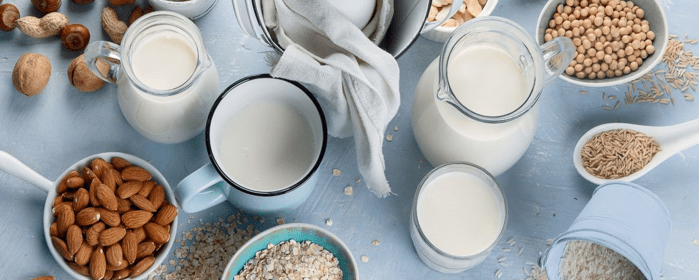In recent years, the popularity of plant-based diets has surged, with many individuals choosing to reduce or eliminate animal products from their meals. As a result, a wide variety of plant-based dairy alternatives have emerged, such as almond milk, soy yogurt, and cashew cheese. But how do these products measure up in terms of nutrition? In this blog post, we’ll delve into the nutritional benefits of plant-based dairy products and why they are gaining favor among health-conscious consumers.
1. Lower in Saturated Fat:
Plant-based dairy alternatives are often lower in saturated fat compared to their animal-based counterparts. High intake of saturated fat is linked to an increased risk of heart disease. By choosing plant-based options, you can help lower your saturated fat intake, promoting better heart health.
2. Cholesterol-Free:
Traditional dairy products contain cholesterol, which can contribute to the development of atherosclerosis (narrowing of the arteries). Plant-based dairy products, on the other hand, are naturally cholesterol-free, making them a heart-healthy choice.
3. Rich in Healthy Fats:
Many plant-based dairy alternatives are rich in healthy fats, such as monounsaturated and polyunsaturated fats. For example, almond milk and soy products provide these beneficial fats, which can help lower bad cholesterol levels and reduce the risk of heart disease.
4. Fortified with Essential Nutrients:
To make up for the nutrients found in dairy products, many plant-based alternatives are fortified with essential vitamins and minerals, including calcium, vitamin D, and vitamin B12. These fortifications ensure that you don’t miss out on crucial nutrients when you choose plant-based options.
5. Lactose-Free:
Lactose intolerance is a common issue for many individuals. Plant-based dairy products offer a lactose-free alternative, making them suitable for people with lactose intolerance or dairy allergies.
6. Reduced Environmental Impact:
Choosing plant-based dairy products often aligns with eco-conscious values. The production of these alternatives generally has a lower environmental impact, reducing greenhouse gas emissions and water usage compared to traditional dairy farming.
7. Diverse Flavor and Textures:
Plant-based dairy products come in a wide array of flavors and textures, allowing you to explore various tastes and customize your diet to your preferences. Whether you enjoy the creaminess of coconut yogurt or the nutty taste of almond milk, there’s something for everyone.
Balanced Diet is Key: It’s important to remember that while plant-based dairy alternatives offer numerous nutritional benefits, they should be part of a balanced diet. To ensure you meet all your nutritional needs, incorporate a variety of plant-based foods, such as fruits, vegetables, legumes, and whole grains.
Plant-based dairy products are becoming increasingly popular for good reasons. They are lower in saturated fat, cholesterol-free, and rich in healthy fats. Plus, they offer various flavors and textures to cater to individual preferences. By choosing plant-based options and maintaining a balanced diet, you can enjoy the nutritional benefits while supporting a healthier you and a more sustainable planet.
Please visit more Health Awareness blogs on our website for more helpful information.


 St. Petersburg, Florida
St. Petersburg, Florida
